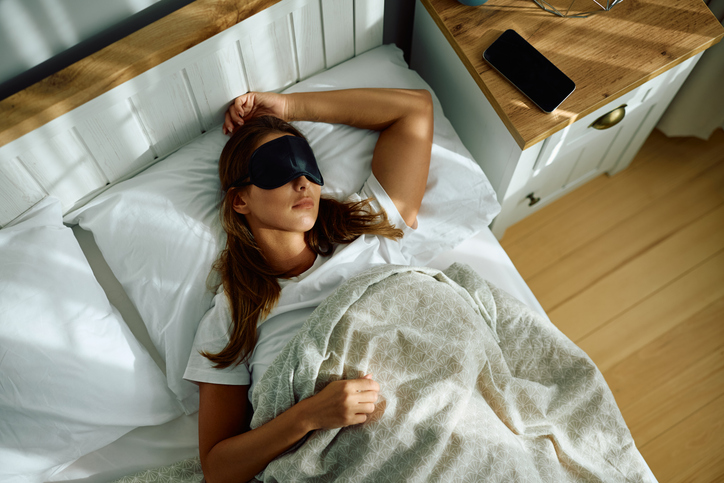How Much Sleep Do You Really Need?
May 1, 2025

You might pride yourself on burning the midnight oil or think you’re functioning fine on five or six hours of sleep—but your body would likely disagree. According to the CDC, a third of all adults in the United States report that they don’t get enough sleep, and that’s troublesome since the benefits of a good night’s rest are numerous. Sleep isn’t just downtime—it’s when your brain files memories, your body repairs itself, and your mood resets.
So how much sleep do you actually need to feel your best? It’s not a one-size-fits-all answer. While many people are under the assumption they can operate on less than seven hours of sleep a night, research shows that seven hours is just the bare minimum needed.
Here’s everything you need to know about how long you should aim to sleep nightly.
Seven Hours Isn’t Exactly the Golden Rule
According to the CDC, the average adult between the ages of 18 and 60 needs at least seven hours of sleep. “Some people need less than seven hours, while others might need more,” says Eric Zhou, a psychologist at the Division of Sleep Medicine at Harvard Medical School.
While people usually focus on the amount of sleep they need, they forget to consider the quality of sleep they’re having. For instance, you may go to bed at 11 p.m. with an alarm set for 6 a.m., but when do you actually fall asleep, and are you staying asleep all night?
“Instead of focusing exclusively on the number of hours we sleep per night, we should also consider our sleep quality,” says Zhou. It’s about the time you spend in bed every night, but it’s more about the amount of uninterrupted deep sleep you’re experiencing nightly.
Wearable sleep trackers, such as the Oura Ring, Fitbit, or Apple Watch, can provide valuable insight into your patterns and help you develop better sleep habits.
Women May Require More Sleep
The traditional estimate of nightly seven to nine hours of sleep is based on studies that only involved men. This has recently led many to wonder whether or not women need more sleep than men, and several factors suggest they may.
Since women are often caregivers, they are wired to multitask and use more of their brain, while they also report higher levels of stress. This mental exhaustion alone could account for them requiring slightly more sleep every night.
The other factor is hormonal, depending on where they are in their cycle each month, as well as during pregnancy and even after menopause. For instance, the hormone progesterone, which peaks at different times, is a relaxing hormone and often leads to drowsiness.
While not everyone agrees, many health professionals are beginning to recommend more sleep for women, who probably need at least eight hours of sleep a night.
Factoring in Age
The younger you are, the more sleep you need, especially when the body is growing or going through major changes. A newborn needs up to 17 hours of sleep a day, while a teenager between the ages of 13 and 18 needs up to ten.
As you age, melatonin production, which is the sleep hormone, declines. The result of less melatonin is waking up earlier or waking up throughout the night. Once over the age of 61, getting the recommended amount of nine hours of sleep can become more challenging.
How to Get a Good Night’s Sleep
Consistency is key for a good night’s sleep. Try maintaining the same time window between lying in bed and waking up. This works because the body recognizes routine and can be trained to sleep within a specific time frame. “People with good sleep quality often have a predictable sleep window where their sleep occurs,” says Zhou. “Good sleepers are likely to sleep around the same number of hours and stay asleep through the night.”
Physical activity during the day also influences how well you sleep at night. The more activity you incorporate into your day will directly correlate to how much sleep your body needs and therefore, how tired you’ll be by bedtime. “Activity increases your sleep drive,” says Dr. Michelle Drerup, a sleep medicine psychologist. “It’s important to develop exercise as a habit. Pick a time of day that works for you and exercise at the same time every day.”
Refraining from eating two to four hours before bedtime can also help. When we eat, the body must switch gears to digestion, so when you eat right before bed, you must focus on digesting that food and cannot fall into a deep sleep. Eating before bedtime robs your body of its capacity to concentrate on the work it does while you’re sleeping.
The same rule applies to nightly screen time. Studies show that two or more hours of screen time in the evening can disrupt the rise in melatonin you need to fall asleep. Turn devices off at least one hour before bedtime, and replace scrolling with reading a book, taking a bath, or meditating. If you must use your phone at night, reduce your blue light exposure by turning down the brightness or switching to nighttime mode in the evening.
Building a routine that you can stick to ensures the right amount of sleep every night is possible. With Insureyouknow.org, you can store your medical records in one easy-to-review place. The effort you put into a good night’s rest will show in time.
